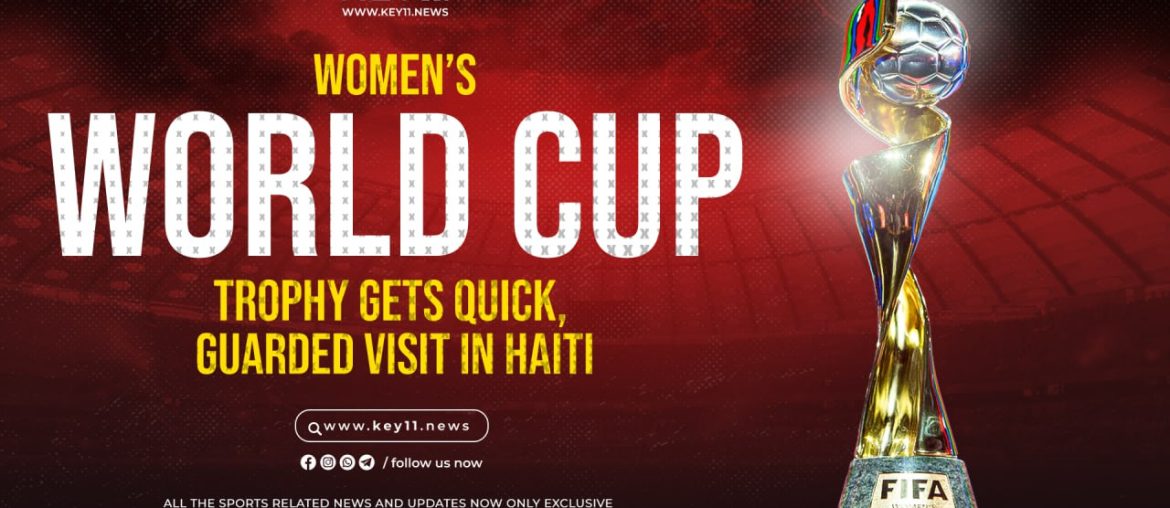Meant to inspire future female football talent, the trophy was surrounded by Haitian authorities, mostly men and a handful of women.
The FIFA Women’s World Cup jewel got a whirlwind visit to Haiti on Saturday, but rather of being recognized with a cortege like in other countries it was only displayed during a small form because of the country’s implacable violence.
Meant to inspire unborn womanish football gift, the jewel was girdled by Haitian authorities, substantially men and a sprinkle of women, including the goalkeeper of the public football platoon and the chairman of the women’s football confederation, Monique André.
The jewel has special significance in Haiti now because its women’s platoon qualified in February for the FIFA Women’s World Cup tests for the first time in the country’s history.
The platoon won its major match a week after a court capsized a continuance ban against former Haitian football confederation chairman Yves Jean- Bart over allegations that he sexually abused womanish players, including minors. FIFA has appealed the decision of the Court of Arbitration for Sport.
Goalkeeper Kerly Théus, who plays for FC Miami, was the only member of the public platoon at the form. “ I’ve no words to express how happy I am. It’s a big thing that we achieved and we plan to move forward, ” she said.
The jewel and an coexisting delegation were attended by police through a aft gate of Haiti’s transnational field to a near hostel for its donation. It was a necessary safety measure in a megacity where over 60 of its areas are dominated by violent gangs, according to police.
The 19- inch (47- centimeter) jewel is one that Milan Pierre- Jerome, a member of Haiti’s women’s football platoon, wants to win. She was born in Florida and is a pupil at George Mason University in Virginia. Her forefather was Haitian, and her father played for Haiti’s football platoon.
“My pater was a pro, so ever since I was out of the womb, it was like, ‘ You got ta play football, ’” she said with a laugh during a recent phone interview with The Associated Press.
She was 14 when she first flew to Haiti for a two- week trial. A month latterly, she got called back and shared in her first Haitian event at 15.
Pierre- Jerome recalled the day the public platoon won its way into the World Cup event with a 2- 1 palm over Chile in February “ It was so emotional. I just flash back crying, crying, crying. This isn’t commodity you can do every day, qualifying for a World Cup. ”
She celebrated by calling her father, who was unfit to help Haiti qualify for the men’s World Cup in 1994.
“I did this for you! ” she recalled telling him. “ He supposedly ran outside the house and down the road. ”
The platoon’s palm sparked jubilation across Haiti at a time when the country is facing gang violence not seen in decades coupled with heightening poverty, wide starvation and political insecurity.
So far this time, gangs have killed further than 530 people and abducted further than 270 others, with worsening violence forcing at least 160,000 people to flee their homes.
Given the situation, the palm in February was a big moment, said Danielle Étienne, a member of Haiti’s football platoon and a pupil at Fordham University in New York.
“It takes down from all the negative effects going on right now, ” she said in a recent phone interview. “ It kind of brings a little light. ”
Étienne was born in the U.S. but her forefather is from Haiti, and she still has family then.
“That palm wasn’t just for the platoon. It was for the entire country, ” she said. “ There’s value in Haiti despite what might be going on. There’s so important value, so much worth. We ’re going to bring the light back on that. ” Know More FIFA Women’s World Cup News…






